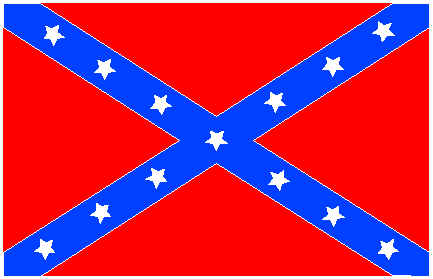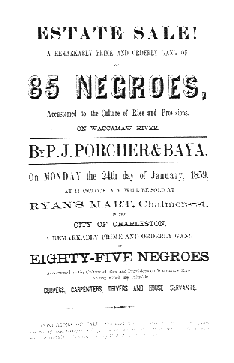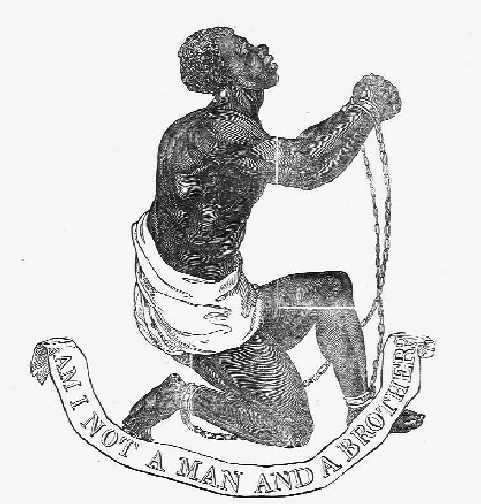|
About the Causes of the Civil War,
the Nature of Southern Heritage, the Confederate Flag, and Other Issues
There have been a lot of myth conceptions spread around about issues
of Southern history recently. This page helps to explore some of these myth
conceptions using facts -- not hearsay -- and actual quotes -- not
interpretations --from those actually involved. Browse through and learn a
little bit more about our "Southern Heritage," but don't be surprised if you
decide that maybe some aspects of our heritage ought to be left in the history
books.
 Myth Conception 1. The Civil War wasn't fought over
slavery -- most Southerners didn't even own slaves.
Myth Conception 1. The Civil War wasn't fought over
slavery -- most Southerners didn't even own slaves.
 This
one is almost (but not really) true. In South Carolina, for example, only
about 47% of the families owned African American slaves on the eve of the
Civil War. So in that sense "most" didn't -- but that tells only part of the
story. What did Southerners themselves say about the cause of the Civil War?
The South Carolina Secession Convention adopted the Declaration of
Immediate Causes Which Induce and Justify the Secession of South Carolina,
written by Christopher G. Memminger of Charleston. In this document the
secession of South Carolina from the Union was rested squarely on two factors: This
one is almost (but not really) true. In South Carolina, for example, only
about 47% of the families owned African American slaves on the eve of the
Civil War. So in that sense "most" didn't -- but that tells only part of the
story. What did Southerners themselves say about the cause of the Civil War?
The South Carolina Secession Convention adopted the Declaration of
Immediate Causes Which Induce and Justify the Secession of South Carolina,
written by Christopher G. Memminger of Charleston. In this document the
secession of South Carolina from the Union was rested squarely on two factors:
- the North's hostility toward slavery, and
- the North's refusal to enforce the
fugitive slave laws.
In fact, in a 4-1 vote, the convention refused to even consider
adding other issues, such as the tariff!
One of delegates, Thomas Jefferson Withers, had earlier written:
"The true question for us is, how shall we sustain African slavery in South
Carolina from a series of annoying attacks, attended by incidental
consequences that I shrink from depicting, and finally from utter abolition?
That is the problem before us - the naked and true point."
So the members of Convention pretty clearly realized that they
weren't concerned about any issue other than their right to maintain,
buy, and sell human property -- African American slaves.
Virginia Senator Robert M.T. Hunter asked, in the Confederate
Congress, "If we didn't go to war to save our slaves, what did we go to war
for"
In his inaugural address, James L. Orr,
who became governor of South Carolina in 1865, remarked, "All parties know
that slavery was the real foundation of the collision. The South engaged in
it to preserve and perpetuate it; the North to destroy it."
 Myth Conception 2: But South Carolina democratically voted
to secede from the Union -- so everyone supported the idea.
Myth Conception 2: But South Carolina democratically voted
to secede from the Union -- so everyone supported the idea.
Actually, the Convention that voted to abolish the Union in South
Carolina was carefully picked by the legislature. Of the 169 delegates almost
all were slave holders -- and nearly half owned 50 or more slaves. This group
represented the elite of South Carolina's political and slave-holding class:
five former governors, 40 former state senators, 100 former state
representatives, 12 clerics, and many lawyers. This was no cross-section of
South Carolina (remember that only 47% owned slaves, only 9% of the slave
owners held 50 or more slaves, and only about 4% of all of South Carolina's
families held 50 or more slaves). This group had a vested interest
in making sure that slavery continued unmolested.
In fact, when you look at all of the state conventions you see a
similar scenario. The Union was dissolved not by any popular vote, but rather
by 854 men (no women), all selected by their various state legislatures. And
157 (nearly a fifth) of these actually voted AGAINST secession. So the fate of
the Union -- and the fate of 9 million people -- was decided by fewer than 700
mostly middle or upper class white males. And in Tennessee, where a popular
vote did defeat secession, the governor orchestrated the dissolution of the
Union single handedly!
 Myth Conception 3: The Civil War was really about the
Constitution -- about legal issues.
Myth Conception 3: The Civil War was really about the
Constitution -- about legal issues.
Perhaps more than anything else, this was a smokescreen created by
Southerners to make secession more palatable -- it was a device they used to
such an extent that even they probably began to believe it. But it is just a
myth.
If you read the congressional debates, or Southern editorials, or
the speeches of the leading fire brands you get no list of rights that were
endangered by the Union, except for one "right" -- that of owning other human
beings. No one was complaining that the federal government was interfering
with state taxation, or the building of roads, or internal commerce, or the
development of state militias, or external trade, or anything else. In fact,
one historian, William C. Davis, observes that, "states rights" wasn't really
even used as a defense until 1865 -- when it was used by the builders of the
"Lost Cause" to distance themselves from what the Civil War was really all
about -- slavery.
In fact, South Carolina's champion of state's rights, John C.
Calhoun, was quick to support a program of internal improvements that used
federal money to build roads and canals in the 1820s -- a scheme that was a
far bigger challenge to state's rights than anything previously seen. Earlier,
in 1812, his fiery nationalism pushed a declaration of war against Britain. It
wasn't until late in life -- after several failed attempts to become president
of the United States -- that he turned away from his nationalistic stands and
toward what many regard as a "fanatical regionalism."
If the South was so concerned about Constitutional rights, let's
look at how the Confederacy dealt with constitutional issues on her own soil.
Freedom of the press was always tenuous -- beginning with the Secession
convention in Charleston. At that time Robert Barnacle Rhea advised the editor
of the New York Evening Post not to send a reporter: "No agent or
representative of the Evening Post would be safe in coming here . . . He would
come with his life in his hand, and would probably be hung." On April 14,
1861, even before President Lincoln called out troops to suppress the
rebellion, the Confederate States arrested a journalist, Lawrence Matthews,
for his reporting in Pensacola, Florida. And throughout the Civil War,
journalists were required to obtain travel passes. And the Confederacy's
President, Jefferson Davis, had no philosophical turmoil suspending the writ
of habeas corpus and jailing Southerners without specified cause. In fact, it
was only 15 years after the Civil War, when Jefferson began writing The
Rise and Fall of the Confederate Government, that he began to construct
the myth of constitutionalism.
 Myth Conception 4: But the Constitution was
just a contract and Southerners had the right to break that contract.
Myth Conception 4: But the Constitution was
just a contract and Southerners had the right to break that contract.
There are actually few ways to unilaterally break a contract. In
December 1860 when South Carolina broke "the contract," the Union had done
nothing to interfere with slavery -- or any other right. Nor would anything
be done that interfered with "state's rights" for another two years. In
actuality, South Carolina left the Union out of a fear of future actions --
which any lawyer will tell you is not an acceptable reason to break an
agreement or contract!
 Myth Conception 5: It still couldn't have been
about slavery -- look at all the yeoman farmers that fought for the South.
Myth Conception 5: It still couldn't have been
about slavery -- look at all the yeoman farmers that fought for the South.
That's true, yeoman farmers did fight for the South. In fact, like
most wars, the poor do the bulk of the fighting, and dying. But look at the
propaganda that urged them on -- that encouraged them to look at this fight
for slavery as their fight. The South Carolina elite had been
organizing yeoman farmers into local vigilant associations and minute man
organizations during all of 1860 -- all in an effort to win the hearts and
minds of poor whites.
As early as 1858 the Charleston Mercury proclaimed: "the free white
man here stands above and superior belonging to the master ruling class . . .
. He has every reason to make property secure and to perpetuate justice and
freedom amongst those of his class." By 1860 the Charleston Mercury was urging
its readers to "inform every man (the nonslaveholder as well as the
slaveholder) of the deep and vital interests that are involved in our slavery
institutions" and readers were warned that they must protect the "rights of
freemen" against the "tampering thieves of abolition."
Yeoman farmers were reminded that in property rights -- such as the
right to own African slaves -- lay their claim to masterhood and all of its
prerogatives. One fire-eater went to great lengths to explain what
emancipation of slaves would mean to "the non-slaveholding portion of our
citizens," observing that yeoman would then have no rights that weren't also
conferred on slaves. "In no country in the world does the poor white man
whether slaveholder of non-slaveholder occupy so enviable a position as in the
slaveholding states of the South."
Poor whites were told, "The poor man has as much at stake [in
slavery] as he who is possessed of hundreds of negroes. . . . He has his all
at stake" including his person, his wife, his children. "These two races
[white and "negro"] cannot live together on terms of equality."
Yeoman farmers were told that if they didn't fight to support
slavery their worlds who tumble down around them and they would be no better
than slaves. After a while, when the issue of slavery became more divisive,
Southern leaders turned to the idea of "sacred civil liberties" in order to
justify the dissolution of the Union.
 Myth Conception 6: But slaves were more than
property, they were part of the owner's family.
Myth Conception 6: But slaves were more than
property, they were part of the owner's family.
 This
is just another smoke screen, trying to make it seem inconceivable that the
Civil War was fought over slavery. But listen to what a few Southerners had to
say: Alexander H. Stephens, the vice-president of the Confederacy, in 1861,
wrote that the cornerstone of the Confederacy "rests upon the great truth that
the negro is not equal to the white man." The Confederacy's president,
Jefferson Davis, was even more blunt: "We recognize the negro as God and God's
Book and God's Laws, in nature, tell us to recognize him -- our inferior,
fitted expressly for servitude . . . You cannot transform the negro into
anything one-tenth as useful or as good as what slavery enables them to be." This
is just another smoke screen, trying to make it seem inconceivable that the
Civil War was fought over slavery. But listen to what a few Southerners had to
say: Alexander H. Stephens, the vice-president of the Confederacy, in 1861,
wrote that the cornerstone of the Confederacy "rests upon the great truth that
the negro is not equal to the white man." The Confederacy's president,
Jefferson Davis, was even more blunt: "We recognize the negro as God and God's
Book and God's Laws, in nature, tell us to recognize him -- our inferior,
fitted expressly for servitude . . . You cannot transform the negro into
anything one-tenth as useful or as good as what slavery enables them to be."
 Myth Conception 7: African slaves in South
supported the Confederacy.
Myth Conception 7: African slaves in South
supported the Confederacy.
A few did. But it's pretty clear that the
South never trusted African Americans. Confederate States Attorney P.H.
Aylett remarked, "It is a matter of notoriety in the section of the
Confederacy where raids are frequent that the guides of the enemy are nearly
always free negroes and slaves." And Confederate Secretary of War James A.
Seddon rejected a request to allow free blacks in Culpeper County, Va. to cut
and haul wood, saying, "The free negroes are not such faithful friends I fear
as to make them reliable in a County so likely to be visited by the enemy."
Even more telling is that in all of the identified records, never
was an African American prisoner in the Confederacy identified as a "Union
man," as so many whites were. It seems that they were all assumed to be Union
supporters and there was no point in making this notation. As one modern
historian, Mark E. Neely, Jr. has noted, "Confederate authorities surely knew
that almost no African American, free or slave, was genuinely loyal to the
Confederacy."
 Myth Conception 8: It wasn't a "civil war," it
was a "war between the states."
Myth Conception 8: It wasn't a "civil war," it
was a "war between the states."
This is one of the most frivolous myth conceptions. A few try to
claim that this is a misnomer on two accounts. First, they tell us that a
"civil war" is a war between two opposing groups fighting for control of the
same nation -- and that the South fought only for control of itself (and its
nearly 4 million slaves). Second, they tell us that the war wasn't between
citizens of the same country, but between two opposing countries.
This only demonstrates a basic misunderstanding of definitions.
Dictionaries tell us that a "civil war" is "a war between opposing groups of
citizens of the same country" or something similar. They say nothing about
them fighting for control of the same country. One historian cuts to the heart
of the matter, explaining that a civil war is simply a conflict "in which
citizens fight among themselves." And that is certainly what happened in
America between 1861 and 1865.
But what about this claim that Southerners weren't part of the same
country -- that the Confederacy was a separate nation? Virtually everyone
defines nationhood as consisting of three things: (1) setting up and
maintaining a civil government, (2) protecting territorial integrity, and (3)
being recognized as a nation by other countries. Of these three elements, the
Confederacy achieved -- at best -- only the first and even the civil
government barely functioned. The Confederacy lost territory almost from the
outset. And as for international recognition -- not a single nation granted
formal diplomatic relations or exchanged ambassadors.
At best, then, the Confederacy was an organized
insurrection or separatist movement -- and the rebellion was a civil war.
 Myth Conception 9: Slaves were valuable and
had to be well treated.
Myth Conception 9: Slaves were valuable and
had to be well treated.
This myth conception is singularly insulting, since it implies that
slavery is acceptable, as long as slaves are treated well. And it implies that
as long as slave owners weren't "Simon Legares" then bondage might even have
been good for the slaves! Just as importantly, however, it demonstrates
extraordinary ignorance concerning the conditions of slavery that prevailed in
the eighteenth and nineteenth centuries.
For example, Carolina rice fields have been described as charnel
houses for African-American slaves. Malaria and enteric diseases killed off
the low country slaves at rates which are today almost unbelievable. Based on
the best plantation accounts it is clear that while about
one out of
every three slave children on Carolina cotton plantations died before reaching
the age of 16, nearly two of every three African-American children on rice
plantations failed to reach their sixteenth birthday and over a third of all
slave children died before their first birthday.
However valuable slaves might have been, they were
commodities and were used as such. They were valuable -- but only for what
they could produce and for the wealth that they would generate for their
owners.
Confederacies "exist wherever the
future is feared, the present is based on false premises, and the past is
viewed with nostalgia."
--Henry Hobhouse
|